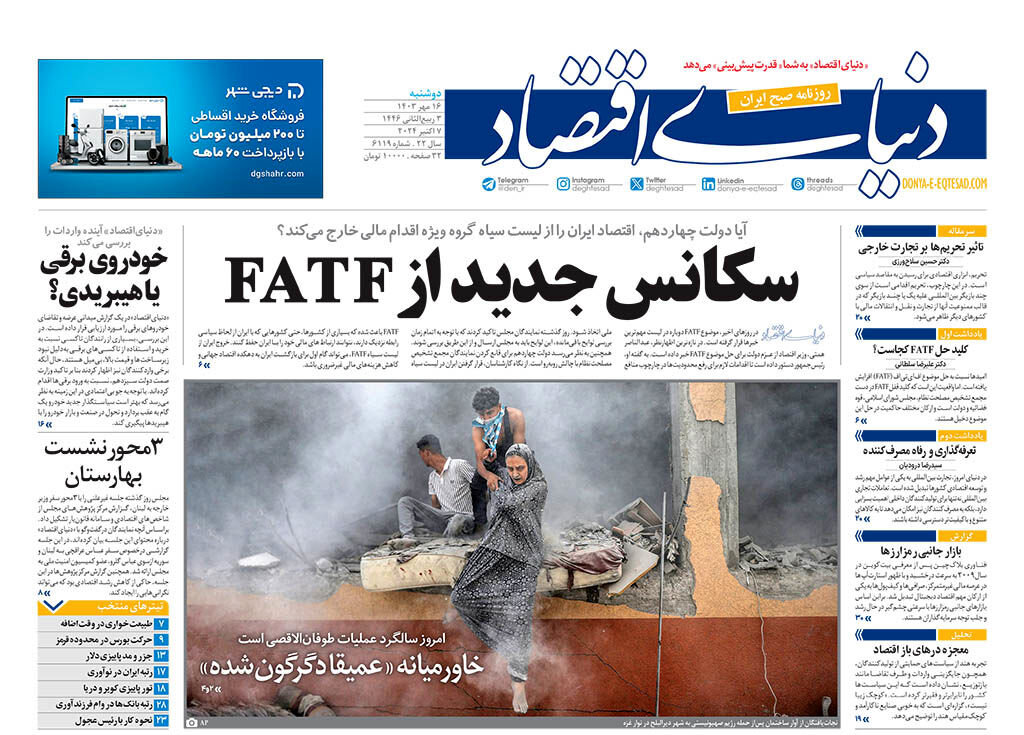The first step to reduce unnecessary costs is to join FATF

TEHRAN - In a note, Donya-e-Eqtesad addressed the issue of the FATF and wrote: According to Abdolnaser Hemmati, the minister of economy, the President has ordered the necessary measures to be taken to remove limitations within the framework of national interests.
A look at the political developments in the past months shows that the current government has a strong desire to review the preconditions of the Financial Action Task Force, while this action also has opponents. Considering that joining the FATF is not a decision made by the government alone, achieving such an agreement requires the cooperation of various legislative and executive institutions. According to experts, putting Iran on the FATF blacklist has made many countries, even countries that have a close political relationship with Iran, unable to maintain their financial relations with Iran. Iran's withdrawal from the FATF blacklist can be the first step for Iran to return to the “global economic village” and reduce unnecessary financial costs.
Iran: Construction of India-Middle East-Europe Corridor
To profit from the region, the West, including the United States, have placed economic dependence on the Zionist regimes. Among the things that are the basis of this dependence are the establishment of the corridor from India to Europe through Israel and increasing the Zionist regime's economic exchanges with the regional countries. One of America's goals in establishing this corridor is to circumvent Asian powers such as China, Russia, and Iran; and in the second step, to turn Israel into a vital passage for East-West trade. Countries such as Iran, Iraq, and Turkey have been set aside and replaced by the UAE, Saudi Arabia, and the Zionist regime. America is trying to replace this corridor with China's new Silk Road (One Belt, One Road) and it has spent a lot of money and energy in the region to advance the project. Iran can undermine this corridor through the capacities that it has. For example, Iran can immediately launch the Chabahar Corridor and the North-South and Russia and West-East corridors that end in Turkey and enter the regional trade corridor.
Kayhan: Importance of True Promise II
In an analysis, Kayhan discussed the importance of Operation True Promise II and the humiliation of Israel and America. It wrote: The importance and beauty of Operation True Promise II were not only penetration of missiles through the Iron Dome and all the defense levels of the Zionist regime but also in their regular penetration and hitting the specific goals. This historic military operation once again humiliated the Zionist regime and the United States in addition to intelligence and security humiliation. Biden and Netanyahu's humiliation was so evident that even after they found out that their threats were ineffective, they sought help from Putin. This operation, by neutralizing all plans of the Zionist regime, was a big failure for the United States, which is the architect of Israel's crimes, to the point that they admitted that "we were shocked"! Despite bringing warships and other military hardware to support Israel they could neither scare Iran nor stop Iran's attacks on Israel!
Javan: Manifestations of Islamic revolution’s hard and soft power
Javan devoted its editorial to two recent important events in Iran and said: Over the past few days we had two “Days of God” when the will of the believers emerged by the grace of God and showed its strength. The first Day of God was realized with the firing of dozens of missiles, which both pushed back the Zionist regime and made the hearts of believers and the oppressed happy in the world. The most beautiful aspect of this move was the excited shout of Palestinian children in Gaza and the West Bank. The second Day of God was realized on Friday when an unimaginably large number of people took part in the Friday prayers led by the Leader of the Revolution. Listening to his sermons once again illustrated the deep relationship between the Leader and the Ummah. These show the true power of the Islamic Revolution, a power that is still standing despite the passage of nearly half a century. If we pay close attention to these two “Days of God,” we can see that the first one is a manifestation of the hard power of the Islamic Revolution against the enemies, and the second one is a manifestation of the soft power and unique love between the Leader and his followers.
